COVID-19 vaccine statistics: Rare side effects

At the time of publication, 10 billion COVID-19 vaccines have been administered globally, with over half (57%) of the world's population completing an initial vaccination series.
If you're considering vaccination, you may be concerned about the long-term risks. You may have heard COVID-19 vaccines can cause blood clots, myocarditis or infertility.
Ease your uncertainty with fact-checked information by our experts in infectious diseases, urology, cardiology, neurology, maternal and fetal medicine and pediatrics. What follows is a deep dive into the statistics of vaccine side effects versus COVID-19, the disease.
While data is current at the time of publication, check credible sources like the Centers for Disease Control and Prevention (CDC) for the latest COVID-19 information.
Can COVID-19 vaccines affect fertility?
Infertility has not been a problem for men or women for any of the COVID-19 vaccines. One study noted vaccines do not affect conception by either partner. Prior COVID-19 infection among women also does not affect conception. However, recent COVID-19 infection among males does affect their fertility and ability to conceive.
Infertility in women:
The CDC has been monitoring COVID-19 vaccination before, during and after pregnancy. There's no evidence of vaccines affecting fertility.
In studies of people undergoing in-vitro fertilization (IVF), COVID-19 vaccination did not affect ovarian function or implantation. Comparing the IVF cycle before and the IVF cycle immediately after vaccination found no difference in patients' performance or ovarian reserve.
A joint statement from the American College of Obstetricians and Gynecologists (ACOG), the American Society for Reproductive Medicine (ASRM) and the Society for Maternal-Fetal Medicine (SMFM) says there is, "no evidence that the vaccine can lead to loss of fertility."
Infertility in men:
The COVID-19 vaccines do not cause swollen testicles, erectile dysfunction (ED) or lower sperm count. However, studies show COVID-19 infection can cause each of these issues.
- ED was three times higher in men with a prior COVID-19 infection (28%) than in men who had not had COVID-19 infection (9%) in a small study
- COVID-19 can temporarily decrease sperm count for some men
- 10% to 22% of men with COVID-19 infection experience swollen testicles
- Infection temporarily limits male ability to conceive
Nebraska Medicine urologist Chris Deibert, MD, says "A significant percentage of men will experience testicular swelling or swelling of the epididymis after symptomatic COVID-19 infection."
Myocarditis or heart issues after COVID-19 vaccination
Myocarditis means heart inflammation. Cases range from very mild (symptoms go away on their own) to severe. Severe myocarditis may require intensive hospital care, cause permanent damage to the heart muscle or even death.
Nebraska Medicine cardiovascular physician Daniel Anderson, MD, PhD, sees patients who have heart failure and heart rhythm problems due to COVID-19 infection. A study found half of 1,216 COVID-19 patients had heart abnormalities.
The disease:
Viral infections, like COVID-19, can cause myocarditis.
If COVID-19 causes you to seek care, your risk of myocarditis rises. The CDC reports COVID-19 patients had 16 times higher myocarditis risk compared to patients without COVID-19. The rate of myocarditis among all COVID-19 patients (inpatient and outpatient) was about 1,500 cases per 100,000 patients with COVID-19.
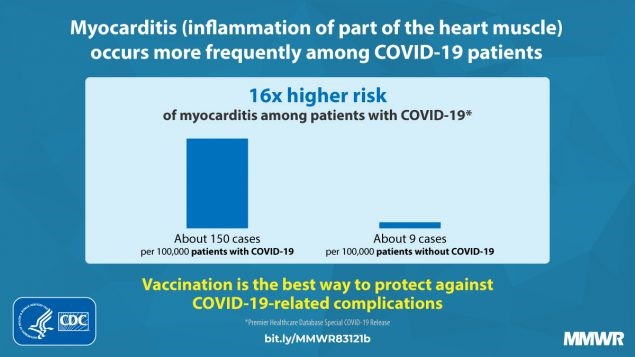
Source: CDC, Association Between COVID-19 and Myocarditis Using Hospital-Based Administrative Data
The vaccine:
COVID-19 vaccines can cause myocarditis. A large study found 1,626 cases of myocarditis among 192,405,448 persons who received mRNA-based COVID-19 vaccines – a rate of 8.5 cases per million people (0.000845%).
A Nature Medicine study found there was a greater risk of myocarditis, pericarditis and cardiac arrhythmia following SARS-CoV-2 infection than following COVID-19 vaccination. The study compared the rates of myocarditis in the month after vaccination to myocarditis in the month after COVID-19 infection.
Compared with COVID-19 myocarditis, myocarditis after vaccination is typically more mild. Among myocarditis after COVID-19 vaccination, the CDC reported 91% of patients were fully or probably recovered three months later.
The majority of myocarditis cases after vaccination have occurred shortly after the second dose of Pfizer in young men. Take note of how your heart feels in the days after vaccination. If you experience chest pain, shortness of breath or heart palpitations, call 911 or go to the emergency room. Most vaccine-induced myocarditis cases respond well to medical attention and treatment.
Dr. Anderson says, "The risk of damage from the virus is much greater than the risk of damage from the vaccines. These vaccines will protect you from heart problems due to COVID-19 infection."
Blood clots from COVID-19 versus vaccines
The disease:
Severe COVID-19 causes unusual clotting. A retrospective U.S. study estimated the rates of blood clots after COVID-19 infection (both hospitalized and non-hospitalized).
A cerebral venous thrombosis (CVT) is a blot clot in the brain. A portal venous thrombosis (PVT) is a blood clot in the vein that connects the liver and the intestines.
Cases of blood clotting per 1 million people:
- PVT after COVID-19: 392.3 cases
- CVT after COVID-19: 42.8 cases
In addition, symptomatic COVID-19 is linked to brain issues, which include inattention, cognitive troubles, fatigue, behavioral troubles and other neurological symptoms.
"Brain dysfunction after COVID-19 infection is quite common," says Nebraska Medicine neurologist Thomas Scott Diesing, MD. "Depending on how it's defined, between 40% and 80% of symptomatic COVID-19 patients have a neurologic complication." This means at least 400,000 per million people with symptomatic COVID-19 experience some kind of neurological issue.
The vaccine:
Blood clots in the brain, abdomen and legs, along with low levels of platelets – the blood cells that help your body stop bleeding – have occurred in a small number of people who have received the Johnson & Johnson COVID-19 vaccine. This outcome is very rare. Called thrombosis with thrombocytopenia syndrome (TTS), this occurs in 3.8 per million people who receive the Johnson & Johnson vaccine. This means 0.00038% of people who get vaccinated with J&J experience TTS.
Most people who developed these problems were female, ages 18 to 49. For women, the risk of TTS after J&J is 5.8 per million. For men, the risk of TTS after J&J is 2.2 per million. Symptoms began approximately one to two weeks following vaccination.
Let's put those numbers side by side with the estimates of blood clots caused by COVID-19.
Cases of blood clotting per 1 million people:
- COVID-19 disease: 392.3 PVT cases
- COVID-19 disease: 42.8 CVT cases
- Johnson & Johnson vaccine: 3.8 TTS cases
"The most effective treatment we currently have is prevention with COVID-19 vaccines," says Dr. Diesing. "The risk of neurological complications after vaccination is exceedingly small – especially compared to the neurological risks of COVID-19 infection. It's multiple orders of magnitude difference."
Common (not rare) side effects of COVID-19 vaccine
In the days following COVID-19 vaccination, your immune system responds to the vaccine. Side effects are actually your body's idea – not the vaccine's. When you get a sore arm, fever or fatigue after vaccination, those reactions are your body's way of jumping into action to protect you.
These "immune effects" include pain where the needle went in, fever, chills, headache, fatigue and body aches. They can last for a few hours up to a few days. Acetaminophen or ibuprofen can ease these side effects, but these medicines should be taken after receiving the vaccine.
Vaccines teach your immune system how to fight a specific disease. For COVID-19, vaccines give your body a tiny piece of the coronavirus spike protein as practice. Vaccines do not give you the live coronavirus or COVID-19.
Temporary lymph node swelling – because your immune system is creating protective antibodies – can also happen.
Why do some people feel worse than others after vaccination? Nebraska Medicine infectious diseases expert Jasmine Marcelin, MD, explains, "How I like to put is that there are different degrees of how loud our immune systems are. Some people's immune systems, like mine, are just really loud, obnoxious even. And then others just go along quietly, do their job and don't make a fuss."
Vaccines during pregnancy
The disease:
Pregnant women are at higher risk for severe COVID-19.
People with COVID-19 during pregnancy are more likely to experience:
- Preterm birth (delivering the baby earlier than 37 weeks)
- ICU admission and mechanical ventilation
- Maternal complications (acute respiratory distress syndrome, sepsis and death)
- Preeclampsia (a serious blood pressure disorder)
Stillbirths were four times as likely for women with recent COVID-19 infection, compared to women without COVID-19 infection.
The vaccine:
There's no evidence COVID-19 vaccines affect pregnancy. It's also not true mRNA vaccines target the syncytin-1 protein. In fact, many people in the vaccine clinical trials became pregnant and had no adverse effects for themselves or their babies. Since then, countless people have delivered healthy babies after vaccination.
COVID-19 vaccines do not increase the risk of preterm birth. Two studies reported no increased risk of miscarriage in people who received either mRNA COVID-19 vaccine during early pregnancy.
Research suggests vaccination does more than protect the pregnant mother: it builds antibodies that can protect the baby, too.
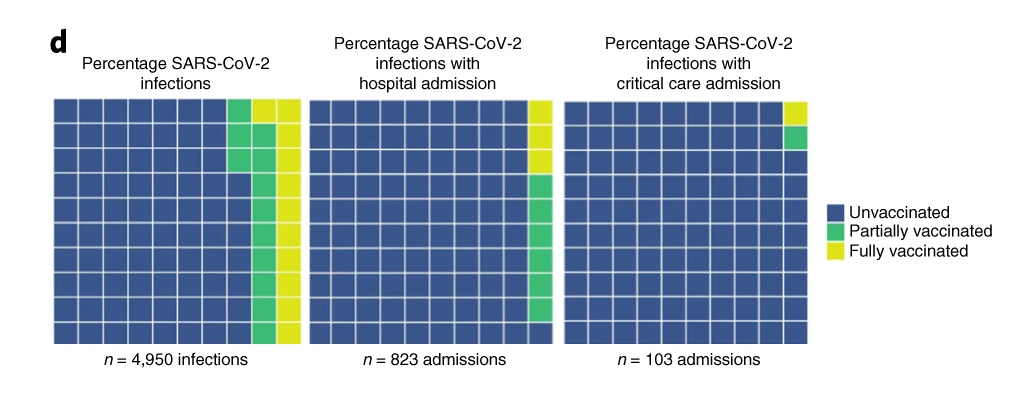
Source: Nature Medicine. SARS-CoV-2 in pregnancy and outcomes by vaccination status. Figure 4d.
Unvaccinated women made up 98% of ICU admissions among COVID-19 cases in pregnant women. Only one out of 100 infected fully vaccinated pregnant women needed ICU admission. An additional pregnant woman who was partially vaccinated (one dose of mRNA vaccine) needed ICU admission.
We encourage pregnant women to talk with their doctors about COVID-19 vaccination.
Multisystem inflammatory syndrome in children
The disease:
Even mild COVID-19 can cause multisystem inflammatory syndrome in children (MIS-C), which may affect more than one area of the body. So far, more than 6,400 children and teens have developed MIS-C.
Warning signs for MIS-C include:
- Vomiting
- Diarrhea
- Headaches
- Bloodshot eyes
- Difficulty breathing
- Seriously tired
- Gray or blue skin
If you see any of these warning signs for MIS-C, take your child to the emergency room. See other COVID-19 statistics specific to children here.
The vaccine:
A CDC study estimated two doses of Pfizer gave children ages 12 to 18 great protection: vaccination had 91% effectiveness against MIS-C.
A large study by the CDC reported 97% of 12 to 18-year-olds hospitalized with COVID-19 were unvaccinated (versus fully vaccinated).
Pediatric infectious diseases expert Kari Simonsen, MD, explains why she's more concerned about the virus than the vaccine. "There's no real biologic reason why we'd anticipate long-term effects of the vaccine," says Dr. Simonsen. "We do know, though, that there can be long-term effects after infection, including prolonged recovery or MIS-C. The prolonged effects of COVID-19 infection are real and more concerning to us as pediatricians than the possibility of a late effect from the vaccine."
COVID-19 vaccine side effects in the long-term
The disease:
What are the long-term effects or symptoms resulting from COVID-19?
Even asymptomatic COVID-19 can cause post-COVID syndrome. Post-COVID syndrome is defined as new or current symptoms that persist more than eight weeks after the original infection, and the individual is no longer testing positive.
Post-COVID syndrome symptoms include:
- Anxiety or depression
- Brain fog (trouble concentrating)
- Chest pain
- Cough
- Fatigue, tiredness or exhaustion
- Heart issues
- Insomnia (trouble sleeping)
- Loss of taste or smell
- Shortness of breath (hypoxia)
COVID-19 has killed more than 1 in 500 Americans. Every hospital has a COVID-19 ward. No hospital has a vaccine injury ward.
"Severe side effects that require medical attention aren't common," says Scott McPherson, MD, Nebraska Medicine family physician. "Hospitalizations for vaccinations haven't been a big problem, whereas certainly with COVID-19, it's more common for people to get sick and need to be hospitalized for the disease."
The vaccine:
It has been more than one year since the COVID-19 vaccines were given outside of clinical trials. Data will continue to be collected two years after the vaccine is administered to ensure safety over the long term. Over 249 million Americans have received at least one shot.
Doctors and health experts are not concerned about the long-term side effects of the COVID-19 vaccines. And for good reason: In the history of vaccines, none have caused reactions in the long term. The vaccine components do not last long in the body.
"mRNA is very fragile, and it's very quickly degraded once inside the body," says infectious diseases expert James Lawler, MD, MPH. "That's one of the reasons why these vaccines must be so carefully preserved at very low temperatures."
Vaccines offer great protection against severe disease and death from COVID-19. A CDC study analyzed how fully vaccinated people were protected against COVID-related outcomes: "Severe COVID-19–associated outcomes (0.015%) or death (0.0033%) were rare."
According to the Nebraska Department of Health and Human Services, Nebraskans who were fully vaccinated (but not yet boosted) were 11 times less likely than unvaccinated Nebraskans to require hospital care in December 2021.
If Nebraskans were up to date on vaccine (i.e. boosted), they were 46 times less likely to be hospitalized than those who hadn't gotten any shots. Nebraska DHHS estimates COVID-19 vaccines prevented 3,200 Nebraskan hospitalizations and 700 Nebraskan deaths during the month of December 2021.
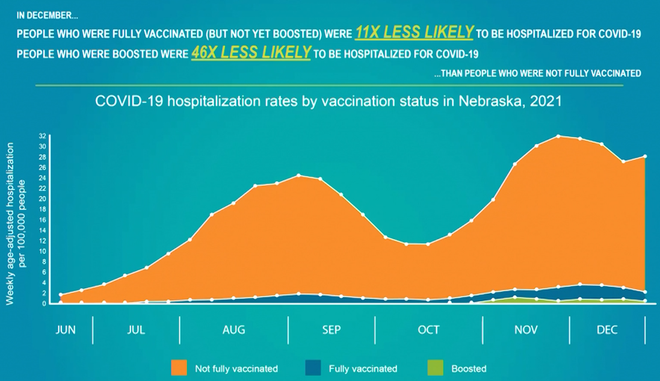
Source: Nebraska DHHS. Fully Vaccinated Nebraskans 11 Times Less Likely To Be Hospitalized For COVID-19; People Who Received Booster 46 Times Less Likely According To DHHS
In December 2021, the CDC says unvaccinated adults were 16 times more likely to be hospitalized for COVID-19 than fully vaccinated adults across the US.
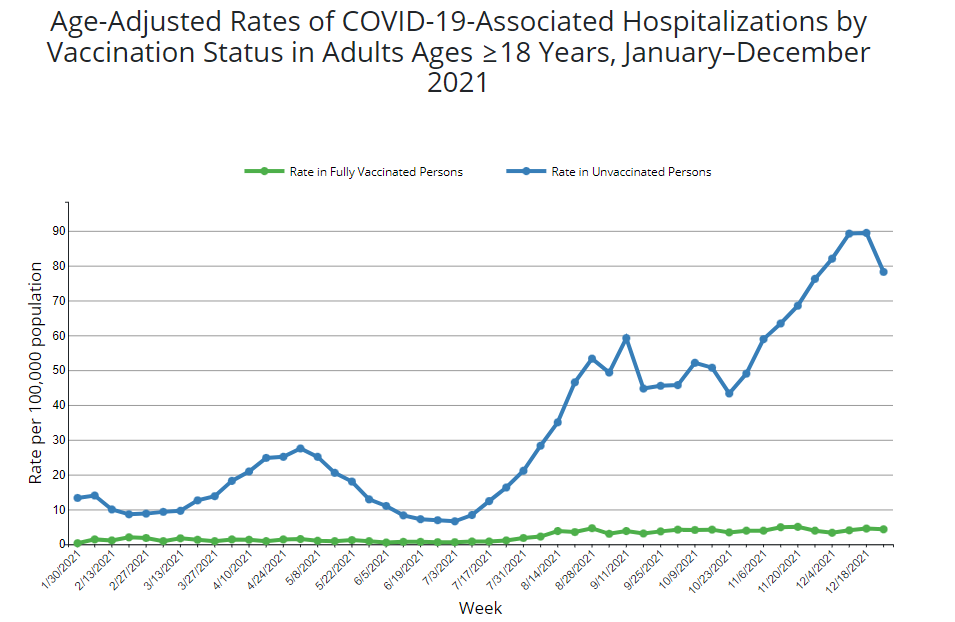
Source: CDC. Rates of laboratory-confirmed COVID-19 hospitalizations by vaccination status
Among adults ages 50 to 64, those with boosters (up-to-date on vaccination) fared a bit better than those who had completed a primary series with no booster. But unvaccinated adults were much more likely than both of these groups to be hospitalized for COVID-19.
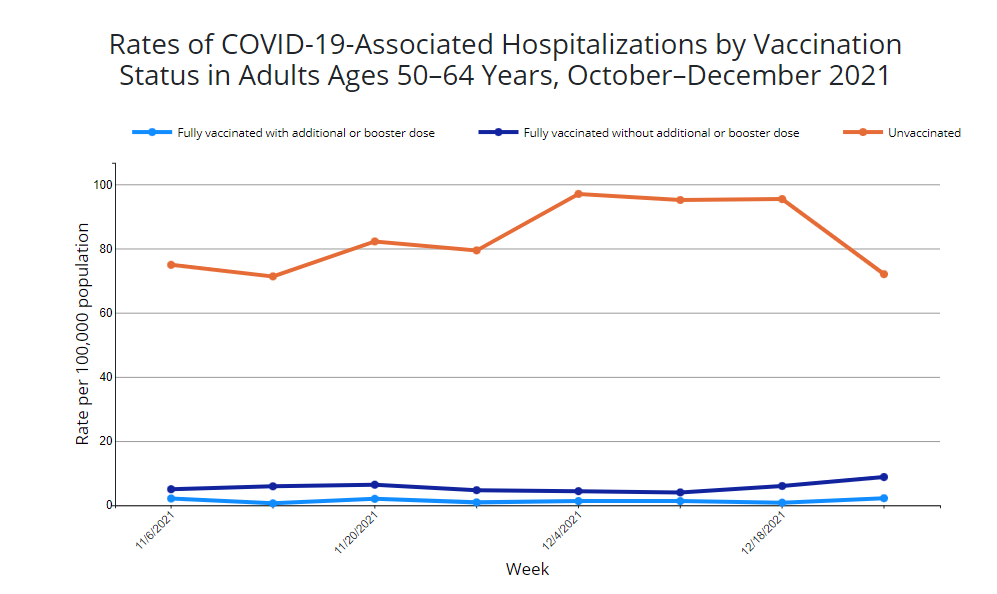
Source: CDC. Rates of laboratory-confirmed COVID-19 hospitalizations by vaccination status
The bottom line:
COVID-19 vaccination lowers your risk of COVID-19 hospitalization and death. The known risks of COVID-19 illness and its related, possibly severe complications, such as long-term health problems, hospitalization and even death, far outweigh the potential risks of having a rare adverse reaction to vaccination like myocarditis or blood clots. COVID-19 vaccines do not affect pregnancy or fertility.
Schedule your COVID-19 vaccine or booster
Other vaccine concerns and questions
- What to do if you're scared of needles
- Watch infectious diseases expert James Lawler, MD, MPH, explain pediatric vaccine data in this video
- Why get vaccinated if you can still get and spread COVID-19
- Frequently asked COVID-19 vaccine questions, including side effects and safety
- Find out how VAERS works to monitor vaccine safety





